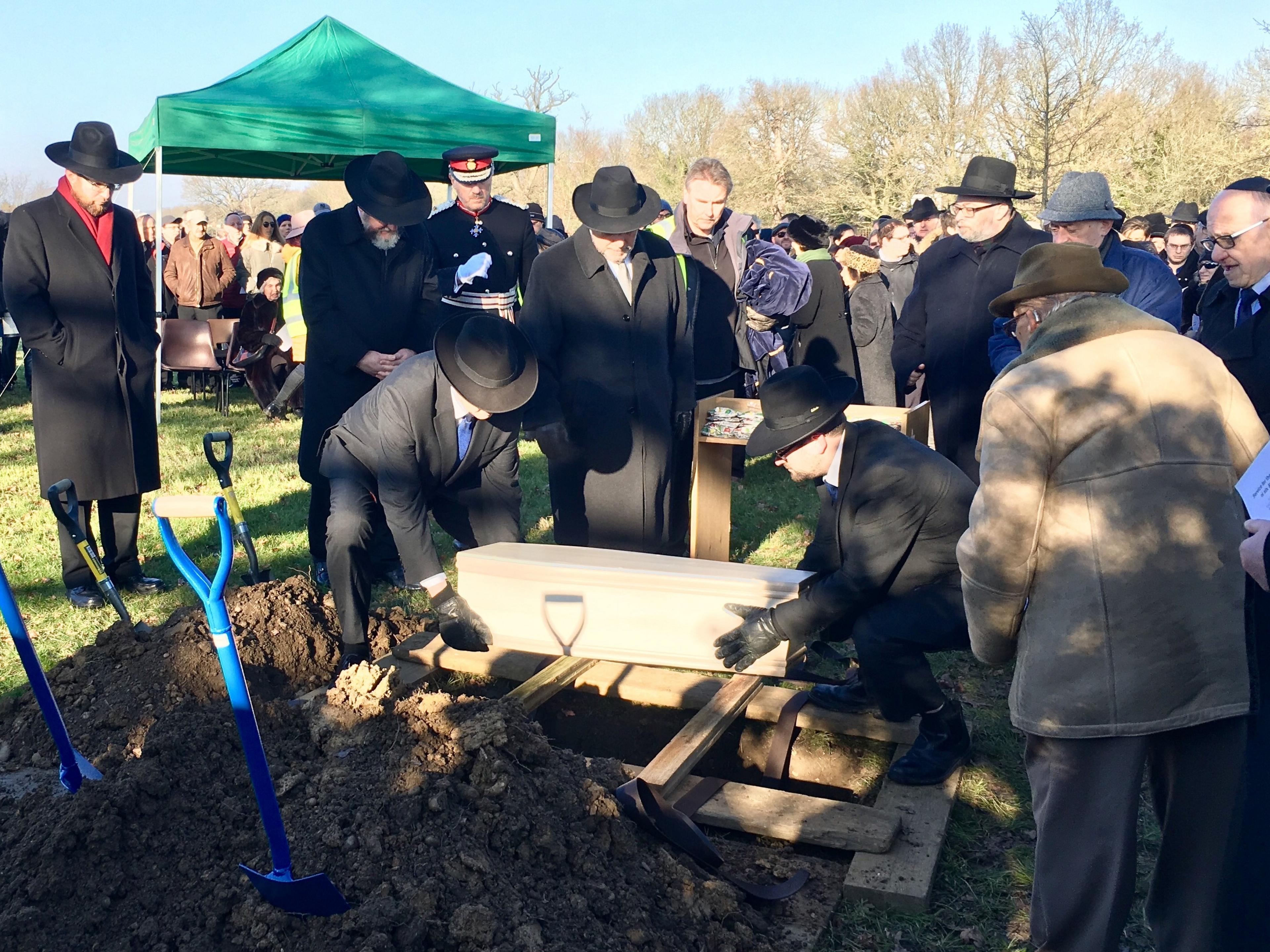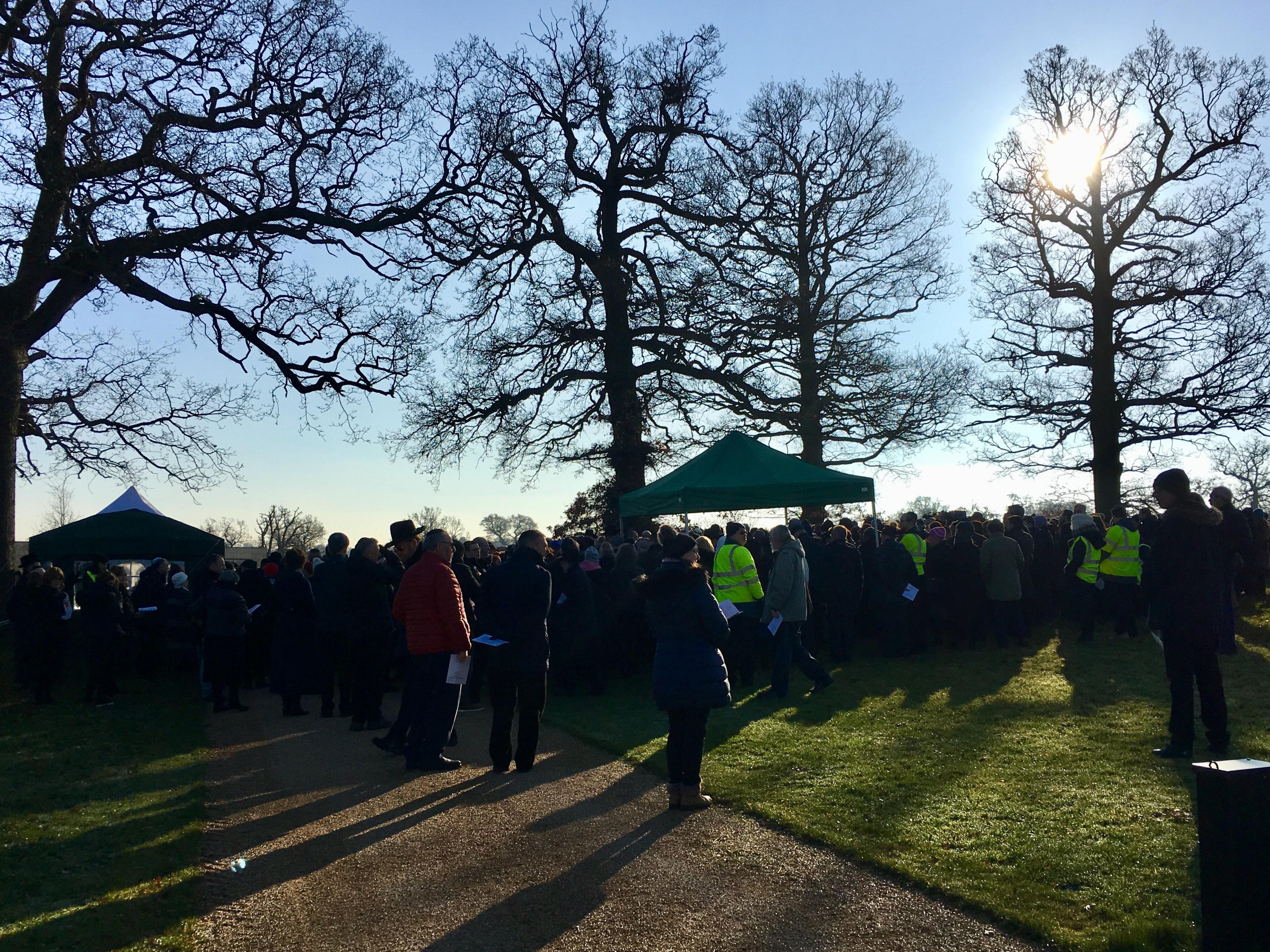Holocaust victims funeral a reminder to 'confront racism'
- Published
Thirty-four Holocaust survivors accompanied the casket to the burial site
The UK's Chief Rabbi has urged an end to rising anti-Semitism, at a funeral for six unknown Auschwitz victims whose remains were donated to a museum.
Rabbi Ephraim Mirvis said hate speech "can easily be translated into hate crime" and the service was a reminder to confront all forms of racism.
The remains of five adults and one child were anonymously donated to the Imperial War Museum in 1997.
The unknown victims were buried with earth from Israel.
Rabbi Mirvis warned: "When anti-Semitism is allowed to thrive, some people can do anything and some people can reach the lowest end of human conduct."
Many of the 1,000 people attending the service at Bushey New Cemetery, Hertfordshire, were moved to tears during the service.
They included survivors and relatives of victims who were murdered during the Holocaust, as well as the leader of the Roman Catholic Church in England and Wales, Cardinal Vincent Nichols.

The donated remains were buried with earth from Israel
Communities Secretary James Brokenshire, the Israeli ambassador and the deputy German ambassador were also there.
After the ceremony, Mr Brokenshire said: "We must continue to challenge racism, anti-Semitism and bigotry and where hatred can lead."
The MP also said he hoped the funeral would bring people together and underline the message of "never again, never forget and that none of us can simply stand by the side and allow this to happen".
At least six million Jews were murdered by the Nazis and their allies during World War Two,
Many were starved and gassed to death, and their remains incinerated, including more than a million men women and children who were murdered in the Auschwitz death camp in German-occupied Poland.
The human remains were among a large number of objects relating to the Holocaust given to the museum by a donor.
They are understood to have been removed during a visit to the Auschwitz site several decades ago.
The Imperial War Museum (IWM) has a license to hold such items and the remains have been kept in storage for two decades.
The leader of the Holocaust Galleries at the IWM, James Bulgin, said: "The museum receives thousands of objects, but something like this is unusual to the point of complete uniqueness.
"Hundreds of thousands of people were killed at Auschwitz-Birkenau. Anybody who lost a relative there can consider these remains and think they could belong to my grandfather or mother."
Mr Bulgin described the process of discovering details about the remains as "difficult", adding: "These remains are fragments and also ash, and some of that can't be analysed further."
Through forensic analysis the museum was able to find out that the fragments were the human remains of adults and children.
But because the process is limited, ages, gender or other personal details remain unknown.
'Exceptional poignancy'
In his address, Rabbi Mirvis addressed the six victims.
He said: "We don't know who you are, we don't know if you're male or female, we don't know which country you're from, but one thing we do know; you were Jewish and brutally murdered.
"You were let down badly at the time and now your remains have somehow come to the UK. And we have the opportunity of granting you the dignity and honour of a funeral service."

About 1,000 people attended the service in Hertfordshire
Previously Rabbi Mirvis said the symbolism of the funeral service was enormous.
"We find exceptional poignancy in the fact that there are six souls that we are burying," he said.
"Each one stands for one million souls who perished. And interestingly enough there were just under five million who were adults and just over one million who were children."
Rabbi Mirvis added: "There were members of my family who perished in the Holocaust and we all related to this directly. Now we will have the opportunity to accord them some dignity and to give them a final resting place."
He said he hoped the site would become a place of pilgrimage for Jewish families, much like the tomb of the Unknown Soldier.
But he also reflected on the memorial's timeliness for wider society, adding: "We need a strong reminder such as this to let us know what can result, even within a democratic society, what can result if anti-Semitism, if racism and xenophobia, go unchecked."
The Prince of Wales, who is patron of the Holocaust Memorial Day Trust, has sent a letter of condolence to the Jewish community.